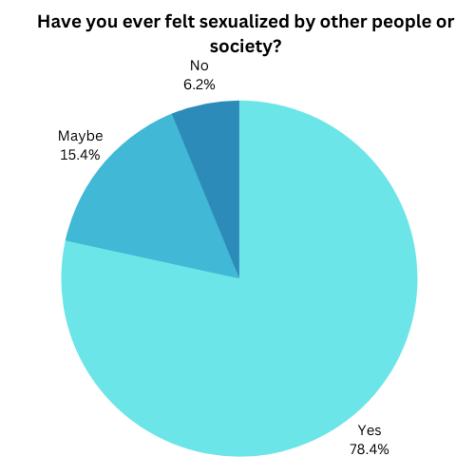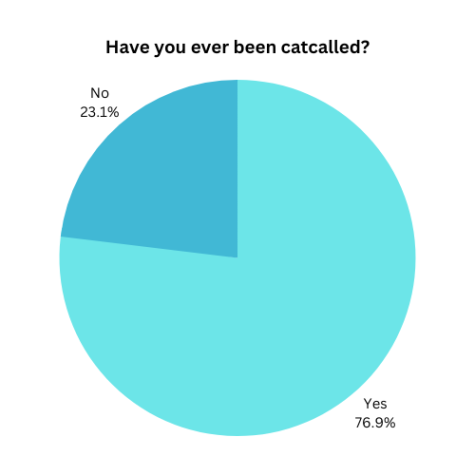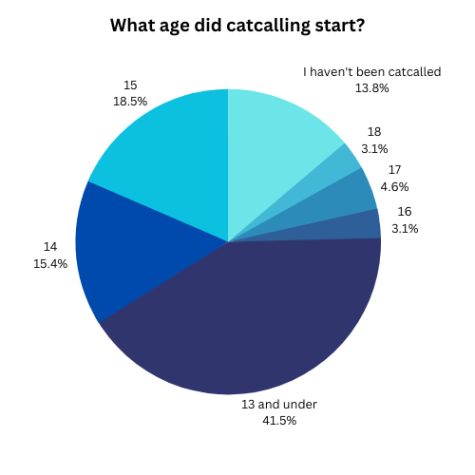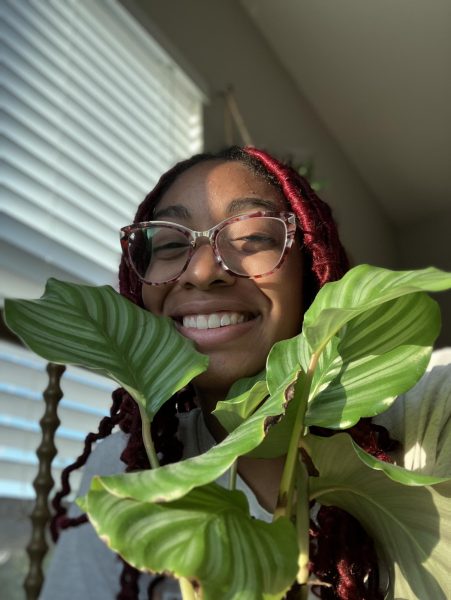Surveying Effects of Oversexualization of Girls in Society
May 1, 2023
 Westwood Student Press emailed a survey to the Westwood student body about the sexualization of teenage girls through a Google Form. The survey got 65 responses.
Westwood Student Press emailed a survey to the Westwood student body about the sexualization of teenage girls through a Google Form. The survey got 65 responses.
“Girls can’t do anything without men thinking that they are doing it for men’s attention,” said an anonymous respondent to the survey.
79% of respondents to the same survey said that they felt sexualized by others or society.
- 60% feel like over-sexualization has influenced the way they dress
- 75% feel that they are judged for the way that they dress
- 77% had been catcalled
- 42% were catcalled before age 13
The “male gaze,” a term first used by film critic Laura Mulvey in 1975, refers to how women and girls are often sexualized in media to appeal to male audiences. These ideals are often unrealistic, with Psychology Today noting that the male gaze refers to how women are depicted in media to appeal to a male audience. Consuming media that sexualizes and objectifies women often has negative impacts on how women view themselves.
“Oftentimes I feel not only sexualized but commodified by older men, as if my temporary state of youth is something that only exists to fulfill the fantasies of older men and something to be had or taken,” an anonymous student said. “Sometimes as women [in] society, it can feel like the only way to achieve male validation, which we are told is the only thing that [matters], [is feeding] into the male gaze and their fantasies.”
A report by the American Psychological Association (APA) on the sexualization of girls in media found that girls are depicted in a sexual manner, dressed in revealing clothing, and posed in body postures and facial expressions that imply sexual readiness more often than their male counterparts. The same study also found that the sexualization and objectification of a person can undermine their confidence and comfort with their own bodies, leading to emotional problems such as shame and anxiety.
 “[The] oversexualization of teenage girls hurts their body image and makes them feel like they should be attractive to men or [that] they should feel thankful when they get catcalled as it’s a validation of their image,” an anonymous student said. “Overall [it] just leads them to feeling insecure and with [a] need to receive validation from men.”
“[The] oversexualization of teenage girls hurts their body image and makes them feel like they should be attractive to men or [that] they should feel thankful when they get catcalled as it’s a validation of their image,” an anonymous student said. “Overall [it] just leads them to feeling insecure and with [a] need to receive validation from men.”
 Many respondents described being catcalled at a young age. A study conducted by anti-street harassment non profit organization Right To Be in partnership with the ILR School at Cornell University found that 84% of women worldwide experience street harassment before they turn 17, with the majority of women being catcalled between ages of 11 and 17. In the U.S., 67% of respondents experienced street harassment before turning 14.
Many respondents described being catcalled at a young age. A study conducted by anti-street harassment non profit organization Right To Be in partnership with the ILR School at Cornell University found that 84% of women worldwide experience street harassment before they turn 17, with the majority of women being catcalled between ages of 11 and 17. In the U.S., 67% of respondents experienced street harassment before turning 14.
“I started being catcalled right after I got out of elementary,” Lexy Fell ‘25 said. “I was like 12, 13, wearing normal clothes and these grown men in their cars would just yell or scream things at me or my friends were walking. And [being catcalled] honestly made me feel kind of awkward and then it made me feel insecure.”
There is additional bias towards women of color. A Georgetown University Law study found that adults viewed Black girls as less innocent, needing less protection, and knowing more about sex and other adult topics than white girls of the same age.
“As a Black woman, I am constantly oversexualized and seen more as a sexual object than an actual human,” Faith Wright ‘23 said. “I’ve learned at a young age [that] no matter what I wear it will be inherently sexual. I am seen as a sexual creature meant for conquest.”
Social media also plays an important factor in the over-sexualization of girls. A study done by the National Library of Medicine found that when young girls view sexual images on social media, they can internalize standards of objectification, which can cause depressive symptoms, body image issues, and eating disorders.
“I think that social media and double standards play a huge role in [sexualization],” an anonymous source said. “I think girls feel pressured to sexualize themselves to conform with society’s standards, which is that we should be pretty for people to look at.”
Media sexualization of girls also has a negative effect on boys, as it trains them to view girls sexually and objectify them. According to a report by psychologist Christia Spears Brown Ph.D., consuming media that sexualizes and objectifies girls can cause men to view girls who dress revealingly as “asking for it” and view sexual harassment as normal behavior.
“I was once doing a lab in my chemistry class and I was bending over to make sure I had the exact measurements of a chemical in the beaker,” an anonymous student said. “A guy from my class came up to me and told me I should ‘go home with him.’ I was wearing loose jeans and my jacket around my waist. I think [sexualization is] completely disrespectful and disgusting.”
Discussions and criticisms of media that oversexualizes women are ongoing with certain media stepping away from the conventional standards of the male gaze. This is becoming more and more common as society continues to change and progress.
“We have to keep working against the patriarchy even if men say that there isn’t any inequality any more, [and] that [girls are] making things up,” an anonymous student said. “Because every girl I’ve talked to about this kind of thing has had some experience with it.”


